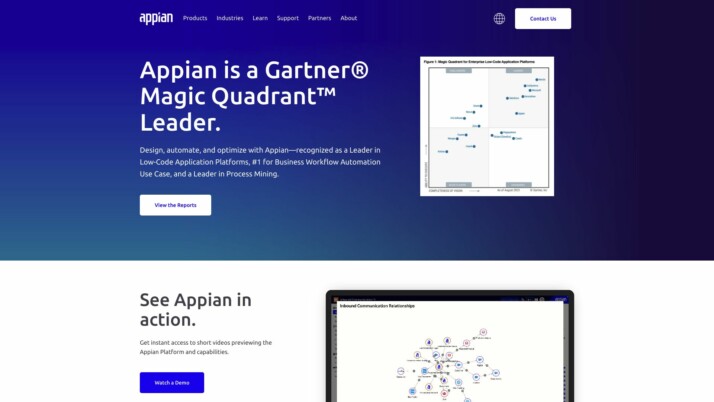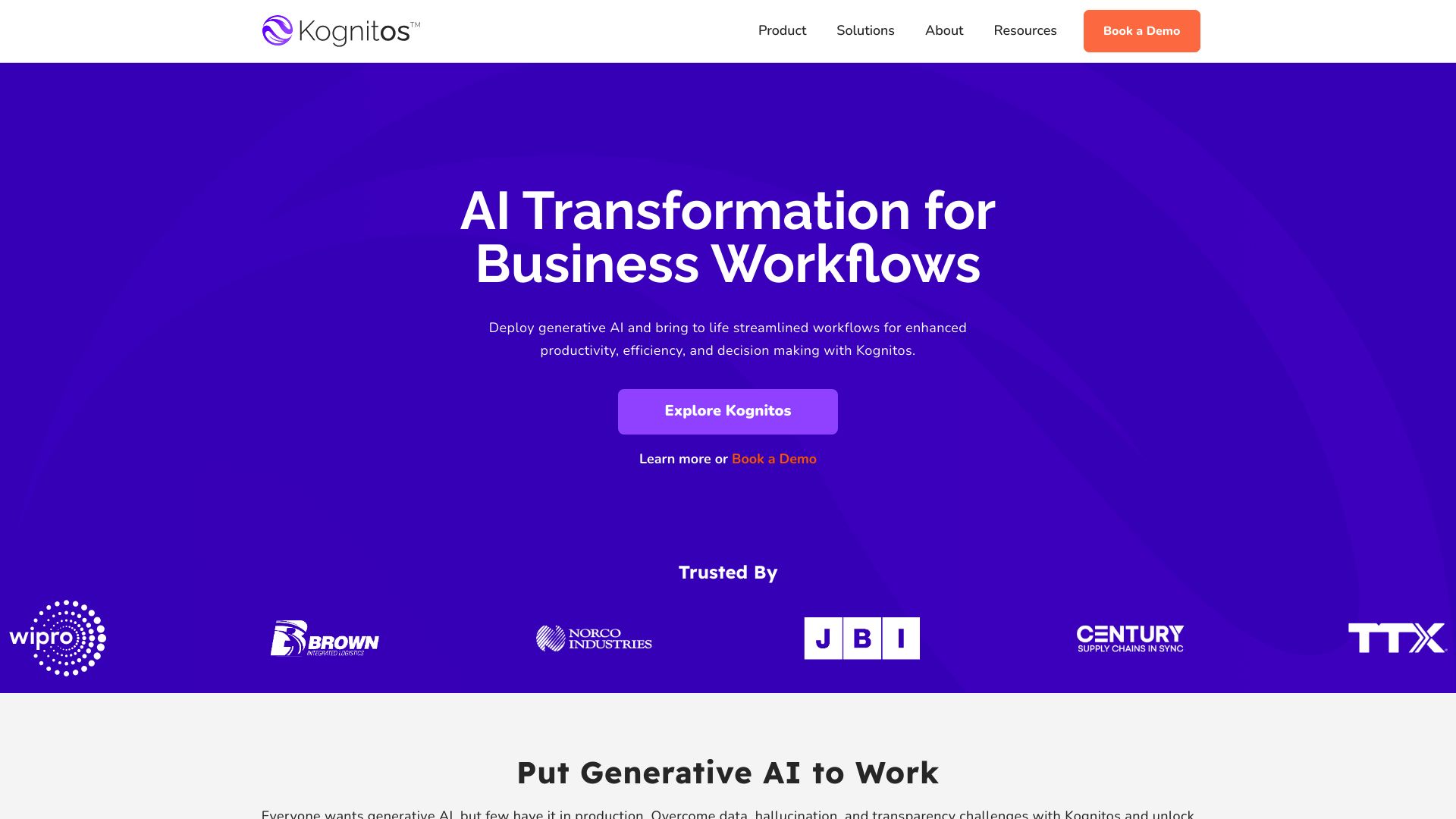Appian vs. Kognitos: AI Automation Platforms Compared
AI-powered automation platforms are transforming how businesses operate, streamline processes, and enhance productivity. This review compares Appian vs. Kognitos, two leading solutions in the AI automation space, examining their unique approaches, strengths, and limitations. We’ll explore how Appian’s low-code platform integrates AI into business workflows, and how Kognitos revolutionizes automation with natural language processing.
By analyzing key features, integration capabilities, and user experiences, we aim to provide a comprehensive understanding of these platforms. We’ll also introduce SmythOS, a versatile alternative that combines the best of both worlds and offers advanced features for businesses seeking cutting-edge AI solutions. Whether you’re a developer, business leader, or AI enthusiast, this comparison will help you make an informed decision about the right AI automation tool for your needs.
Appian Overview
Appian offers a comprehensive low-code platform that integrates artificial intelligence capabilities into business workflows. The platform empowers organizations to build, deploy, and manage AI-powered applications without extensive coding expertise.


Appian’s AI toolkit includes pre-built components for document processing, email classification, and data extraction. These tools leverage machine learning to automate routine tasks, allowing businesses to streamline operations and focus on higher-value work. The platform’s low-code approach democratizes AI development, enabling both technical and non-technical users to create sophisticated AI solutions.
Appian’s AI toolkit includes pre-built components for document processing, email classification, and data extraction. These tools leverage machine learning to automate routine tasks…
Key features of Appian’s AI capabilities include custom model development, integration with external AI services, and robust security measures. The platform supports both cloud and on-premises deployments, catering to organizations with varying infrastructure requirements. Appian’s AI solutions excel in process automation, document management, and decision support across industries like finance, healthcare, and government.
While Appian provides powerful AI tools, users should consider the learning curve associated with its low-code environment. The platform may require some technical knowledge to fully leverage its capabilities, potentially limiting immediate adoption for non-technical teams. Additionally, while Appian offers flexibility, it may not provide the same level of customization as some specialized AI development frameworks.
Appian integrates seamlessly with existing enterprise systems, databases, and third-party services. This interoperability allows organizations to enhance their current technology stack…
Appian integrates seamlessly with existing enterprise systems, databases, and third-party services. This interoperability allows organizations to enhance their current technology stack with AI capabilities rather than replacing it entirely. The platform’s scalability supports growing business needs, from small-scale prototypes to enterprise-wide deployments.
Kognitos Overview
Kognitos revolutionizes business process automation with its AI-powered platform. The software empowers users to create and manage intelligent agents using plain English, eliminating the need for complex coding or traditional bot management.


Kognitos integrates generative AI with traditional logic, enabling powerful automations that adapt and learn through natural dialogue. This approach allows businesses to streamline operations across various domains, including document processing, Excel manipulation, and email handling. The platform’s seamless integration with third-party applications and support for multiple operating systems enhances its versatility.
Kognitos integrates generative AI with traditional logic, enabling powerful automations that adapt and learn through natural dialogue.
A standout feature of Kognitos is its ability to handle exceptions by learning from user input. This adaptability makes it well-suited for managing changes and variations in business processes. The platform also prioritizes user-friendliness, making AI automation accessible to both technical and non-technical users.
While Kognitos offers impressive capabilities, it may have limitations in areas such as multi-agent collaboration and specialized features like sitemap crawling or YouTube transcript processing. Additionally, the platform’s focus on natural language interactions might not suit users seeking more traditional programming approaches to AI development.
Kognitos positions itself as a transformative force in AI automation, aiming to democratize access to intelligent process optimization. Its vision of enabling smarter, more efficient automation while maintaining human control aligns with the growing demand for accessible AI solutions in various industries.
Feature Comparison
Appian and Kognitos offer distinct approaches to AI-powered automation, each with unique strengths and limitations. Appian provides a comprehensive low-code platform with built-in AI capabilities, while Kognitos focuses on natural language-driven automation.
Appian excels in its visual builder and no-code options, making AI integration accessible to users with varying technical expertise. Its pre-built AI components for document processing, email classification, and data extraction streamline common business tasks. Appian’s platform also supports both cloud and on-premises deployments, catering to organizations with diverse infrastructure needs.
Kognitos, on the other hand, revolutionizes automation by allowing users to create and manage intelligent agents using plain English. This approach eliminates the need for complex coding or traditional bot management, making AI automation more accessible to non-technical users. Kognitos’ integration of generative AI with traditional logic enables powerful automations that can adapt and learn through natural dialogue.
In terms of security and compliance, Appian offers robust features including data encryption and API authentication. Kognitos also prioritizes security, though specific details about its security measures are less prominent in the available information.
While both platforms support integration with various APIs and third-party services, Appian’s extensive ecosystem may offer more out-of-the-box integrations. Kognitos, however, emphasizes its ability to handle exceptions and adapt to process changes, potentially offering greater flexibility in dynamic business environments.
Appian and Kognitos both lack certain advanced features found in more specialized AI platforms. Neither explicitly mentions multimodal AI capabilities, advanced debugging tools, or built-in support for foundation models like GPT. Additionally, features such as multi-agent collaboration and specialized data crawlers are not prominently highlighted in either platform’s offerings.
Feature Comparison Table
| Appian | Kognitos | SmythOS | |
|---|---|---|---|
| CORE FEATURES | |||
| Hosted Agents (Dev, Production) | ❌ | ✅ | ✅ |
| Visual Builder | ✅ | ❌ | ✅ |
| Autonomous Agents | ❌ | ✅ | ✅ |
| Multi-Agent Collaboration | ❌ | ✅ | ✅ |
| Agent Work Scheduler | ❌ | ✅ | ✅ |
| SECURITY | |||
| Constrained Alignment | ✅ | ❌ | ✅ |
| IP Control | ✅ | ❌ | ✅ |
| COMPONENTS | |||
| Foundation AIs | ❌ | ✅ | ✅ |
| Huggingface AIs | ❌ | ✅ | ✅ |
| Zapier APIs | ❌ | ❌ | ✅ |
| Data Lakes | ✅ | ❌ | ✅ |
| DEPLOYMENT OPTIONS (EMBODIMENTS) | |||
| Deploy as Webhook | ✅ | ❌ | ✅ |
| Deploy as Site Chat | ❌ | ❌ | ✅ |
| Deploy as Scheduled Agent | ❌ | ✅ | ✅ |
| Deploy as GPT | ❌ | ❌ | ✅ |
| DATA LAKE SUPPORT | |||
| Hosted Vector Database | ❌ | ❌ | ✅ |
| Sitemap Crawler | ❌ | ❌ | ✅ |
| YouTube Transcript Crawler | ❌ | ❌ | ✅ |
| URL Crawler | ❌ | ❌ | ✅ |
Best Alternative to Appian and Kognitos
SmythOS emerges as the superior alternative to Appian and Kognitos, offering a comprehensive AI automation platform that combines powerful features with unparalleled ease of use. We designed SmythOS to address the limitations of traditional automation tools while providing a flexible, scalable solution for businesses of all sizes.
Unlike Appian’s low-code approach or Kognitos’ natural language focus, SmythOS offers a true no-code visual builder that empowers users to create sophisticated AI agents without any programming knowledge. Our intuitive drag-and-drop interface allows for rapid development and deployment of AI solutions, significantly reducing the time and resources required to bring automation projects to life.
SmythOS offers a true no-code visual builder that empowers users to create sophisticated AI agents without any programming knowledge.
SmythOS stands out with its extensive feature set, covering a broader range of capabilities than both Appian and Kognitos. We offer support for hosted agents in development and production environments, autonomous agent functionality, and multi-agent collaboration—features that are either limited or absent in the competitors’ offerings. Our platform also includes advanced components like foundation AI models, Hugging Face integration, and a hosted vector database, providing users with cutting-edge tools for building sophisticated AI applications.
One of the key advantages of SmythOS is its unlimited use cases. While Appian and Kognitos may excel in specific areas like business process automation or natural language processing, our platform’s versatility allows it to tackle a wide array of challenges across industries. From chatbots and virtual assistants to complex data analysis and decision-making systems, SmythOS provides the flexibility to create AI solutions tailored to any business need.
SmythOS provides the flexibility to create AI solutions tailored to any business need.
By choosing SmythOS, users gain access to a comprehensive ecosystem that goes beyond basic automation. Our platform offers seamless integration with popular APIs, supports multimodal AI capabilities, and provides robust security features like constrained alignment and IP control. With SmythOS, businesses can confidently build and deploy AI agents that drive innovation, improve efficiency, and deliver tangible results across their operations.
Conclusion
Appian and Kognitos offer powerful AI-driven automation solutions, each with unique strengths. Appian’s low-code platform integrates AI capabilities into business workflows, providing pre-built components and supporting both cloud and on-premises deployments. Kognitos revolutionizes automation with its natural language approach, allowing users to create intelligent agents using plain English.
While both platforms excel in their respective areas, they may not fully address advanced AI needs such as multimodal capabilities, specialized data crawlers, or extensive multi-agent collaboration. For organizations seeking a more comprehensive and versatile AI solution, SmythOS emerges as the superior choice.
SmythOS combines the best of both worlds and goes beyond, offering a drag-and-drop interface for intuitive agent creation, extensive integration options, and support for multiple AI models. Our platform’s “Create Once, Deploy Anywhere” approach enables seamless deployment across various environments, from APIs to chatbots and scheduled agents. SmythOS also excels in multi-agent orchestration, allowing for complex, collaborative AI systems that can tackle sophisticated business challenges.
With its robust feature set, including advanced debugging tools, multimodal capabilities, and support for foundation models, SmythOS provides unparalleled flexibility and power for businesses of all sizes. We invite you to explore our diverse range of AI-powered agent templates and experience unlimited AI automation risk-free. Discover how SmythOS can transform your AI initiatives and drive innovation in your organization.
Last updated:
Disclaimer: The information presented in this article is for general informational purposes only and is provided as is. While we strive to keep the content up-to-date and accurate, we make no representations or warranties of any kind, express or implied, about the completeness, accuracy, reliability, suitability, or availability of the information contained in this article.
Any reliance you place on such information is strictly at your own risk. We reserve the right to make additions, deletions, or modifications to the contents of this article at any time without prior notice.
In no event will we be liable for any loss or damage including without limitation, indirect or consequential loss or damage, or any loss or damage whatsoever arising from loss of data, profits, or any other loss not specified herein arising out of, or in connection with, the use of this article.
Despite our best efforts, this article may contain oversights, errors, or omissions. If you notice any inaccuracies or have concerns about the content, please report them through our content feedback form. Your input helps us maintain the quality and reliability of our information.
